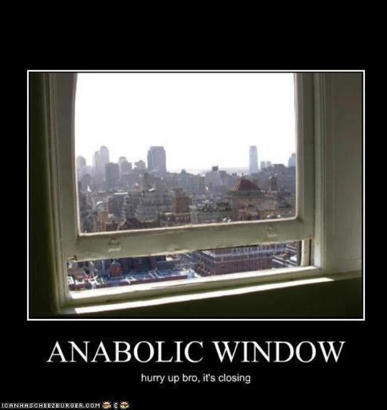Over 40? - EAT PROTEIN WITHIN ONE HOUR OF EXERCISE
Options

RBrigzy
Posts: 152 Member
According to research I have just listed to on the BBC's Radio 4 programme you should eat protein WITHIN ONE HOUR of exercise - as only is this window of time will your muscles absorb protein and build muscle bulk.
The entire programme is VERY interesting and you can listen by following this link:
http://www.bbc.co.uk/programmes/b00tdnjl
The entire programme is VERY interesting and you can listen by following this link:
http://www.bbc.co.uk/programmes/b00tdnjl
0
Replies
-
Your body doesn't build muscle just because you eat protein exercise and other nutrients also factor in. The window you quote is just a window where your body is most receptive to taking in protein in or to repair and rebuild post exercise0
-
Suggest you listen to the programme before deciding your view.0
-
The nutrient timing myth for strength training has been debunked. Overall opinion is that as long as the pre-trained state is well fueled you can eat up to 3 -4hrs after training with no detrimental consequences to muscle protein synthesis.0
-
Again I suggest you listen to the programme.0
-
Does the podcast say what happens when you don't eat protein within an hour of exercising?0
-
zyst - the research shows - if you don't then muscles miss the opportunity to "fill up" with available protein - so muscle build up is lessened. Honestly have a listen when you have a spare half hour.0
-
Again I suggest you listen to the programme.
and I suggest you do further research.
One of the most influential studies conducted that helped launch the anabolic window myth was conducted by Dr John Ivy. Dr Ivy's test subjects were endurance athletes not strength athletes. Both athletes use different metabolic energy pathways to fuel their activity and the impact on glycogen stores is completely different. His findings were very accurate.... for endurance athletes NOT strength athletes.
0 -
-
Ironmaiden4life wrote: »Again I suggest you listen to the programme.
and I suggest you do further research.
One of the most influential studies conducted that helped launch the anabolic window myth was conducted by Dr John Ivy. Dr Ivy's test subjects were endurance athletes not strength athletes. Both athletes use different metabolic energy pathways to fuel their activity and the impact on glycogen stores is completely different. His findings were very accurate.... for endurance athletes NOT strength athletes.
You obviously have not listened to the podcast - this research relates to older people0 -
Ironmaiden4life wrote: »
That explains yesterday. I'm not a big protein eater, so I guess my muscles will continue their lovely deterioration because I don't eat within an hour of my workouts. 0
I'm not a big protein eater, so I guess my muscles will continue their lovely deterioration because I don't eat within an hour of my workouts. 0 -
zyst - the research shows - if you don't then muscles miss the opportunity to "fill up" with available protein - so muscle build up is lessened. Honestly have a listen when you have a spare half hour.
You don't know how to build muscle. Yes I know about this window you are talking about. It has been talked about for over a decade.
0 -
my experience is limited to me only, 45 years old, 16:8 daily fasting, low carb diet. I train fasted, dont eat until 12pm, nearly 2-3 hours after my training, and still lose fat and build muscle. Every persons approach is different. One guy's viewpoint is just that0
-
You obviously have not listened to the podcast - this research relates to older people
and at what age do I need to book myself in to get fitted with this little timer to make sure my anabolic window is properly installed?
Please think about what you are saying and instead of regurgitating some radio show go and research the actual science.
0 -
@RBrigzy Thank you for sharing this, I found it very interesting as someone who
a) is well over 40
b) has severe muscle wastage and
c) has just started using resistance bands.Ironmaiden4life wrote: »
Please think about what you are saying and instead of regurgitating some radio show go and research the actual science.
The person who said it on "some radio show" is Paul Greenhaff, an actual scientist.
Paul Greenhaff is Professor of Muscle Metabolism at the University of Nottingham. He heads the Metabolic and Molecular Physiology Research Group at Nottingham, is Deputy Director of the MRC/ARUK Centre for Musculoskeletal Ageing Research and is a member of the ARUK Centre for Sport, Exercise and Osteoarthritis. Paul is also a member of BBSRC Research Panel A, a member of the Editorial Boards of Acta Physiologica and the Scandinavian Journal of Medicine and Science in Sports.
0 -
-
Thanyou CurlyCockney, I will ignore the folk that didn't listen or take the time to understand the science.0
-
-
-
FunkyTobias wrote: »
Came to see if already posted, leaving happily.0 -
CurlyCockney wrote: »@RBrigzy Thank you for sharing this, I found it very interesting as someone who
a) is well over 40
b) has severe muscle wastage and
c) has just started using resistance bands.Ironmaiden4life wrote: »
Please think about what you are saying and instead of regurgitating some radio show go and research the actual science.
The person who said it on "some radio show" is Paul Greenhaff, an actual scientist.
Paul Greenhaff is Professor of Muscle Metabolism at the University of Nottingham. He heads the Metabolic and Molecular Physiology Research Group at Nottingham, is Deputy Director of the MRC/ARUK Centre for Musculoskeletal Ageing Research and is a member of the ARUK Centre for Sport, Exercise and Osteoarthritis. Paul is also a member of BBSRC Research Panel A, a member of the Editorial Boards of Acta Physiologica and the Scandinavian Journal of Medicine and Science in Sports.
Now go back and look at what the OP wote........ 'you should eat protein WITHIN ONE HOUR of exercise - as only is this window of time will your muscles absorb protein and build muscle bulk'.
Do you honestly believe that the human body has a timer that begins ticking the second you finish physical exertion and will only run for 1 hour then immediately shut off thereby ceasing muscle protein synthesis and terminating metabolic activity?
Good lawd there's simply not enough face palm in the world
0 -
There's little point in facepalming to your own logical fallacy (i.e I didn't say I believed anything, and the radio show didn't make the claims that you are objecting to). As you said, go and research the actual science - including that by the actual scientist on the show. Or don't, it makes no difference to me either way.0
-
Ironmaiden4life wrote: »
Now go back and look at what the OP wote........ 'you should eat protein WITHIN ONE HOUR of exercise - as only is this window of time will your muscles absorb protein and build muscle bulk'.
Do you honestly believe that the human body has a timer that begins ticking the second you finish physical exertion and will only run for 1 hour then immediately shut off thereby ceasing muscle protein synthesis and terminating metabolic activity?
Good lawd there's simply not enough face palm in the world
Not only are you too ignorant to listen to the Professor you then take to insulting people.
This is relevant to the older generation where the mechanism that builds muscle is much less effective.
0 -
Not only are you too ignorant to listen to the Professor you then take to insulting people.
This is relevant to the older generation where the mechanism that builds muscle is much less effective.
As we age our protein requirements differ, you however you were not talking about protein requirements, you were talking about anabolic timing and it's effect on muscle protein synthesis and hypertrophy.
As for ignorance I make a special point to reserve it only for people who watch Dr. Oz, follow Food Babe and believe that the Kardiashian family are not stealing precious oxygen from the rest of us and do in fact serve a purpose
0 -
The rule of thumb is actually shorter: 30-45 mins. It is doing that time that the body starts to repair itself and will search for protein to begin the process. You don't wanna wait to long because you may lose muscle mass that you would hard to gain.0
-
Here's a review of some of the studies: http://nutrientjournal.com/post-workout-anabolic-window/0
-
Correct - I assume for some reason you cannot listen to the article - perhaps if you are in the US you cannot access all BBC online services (?)Ironmaiden4life wrote: »you were talking about anabolic timing and it's effect on muscle protein synthesis
0 -
http://www.ncbi.nlm.nih.gov/pmc/articles/PMC3577439/
This is also interesting and suggests that older people may get benefits from more protein than younger, although everything seems kind of inconclusive.0 -
OP, that podcast was interesting, but it is from 2010 - 5 years ago, and is based on one professor's research. If you read lemurcat12's link, research since has either not supported it, or not been conclusive.
And wouldn't it be inefficient if the human body came with a timer that started working after we had been alive for 40 years making it so specifically difficult to fuel muscle growth? What would be the biologic or evolutionary basis for such a randomly restrictive need?0 -
OP, that podcast was interesting, but it is from 2010 - 5 years ago, and is based on one professor's research. If you read lemurcat12's link, research since has either not supported it, or not been conclusive.
And wouldn't it be inefficient if the human body came with a timer that started working after we had been alive for 40 years making it so specifically difficult to fuel muscle growth? What would be the biologic or evolutionary basis for such a randomly restrictive need?
Evolutionary processes aren't guided by a particular logic in advance0 -
The intended focus here was for older folk as mentioned in the post title - rather than a general "anabolic window" for everyone. This has been overlooked by many replying here I feel. I did not mention "older folk" in the wording in the post content so I can see what happened.
The mentioned article (lemurcat12) from 2013 "Nutrient timing revisited" does in fact reference some of professor Greenhaff's work, and as you say states further research is required to reach conclusion, but does not dismiss his research.
I accept it is not entirely conclusive - only time will tell if he is correct should an entirely conclusive study be completed focusing on older folk. Meanwhile I see no harm in consuming protein not too long after my workout - in case he is correct.
0
This discussion has been closed.
Categories
- All Categories
- 1.4M Health, Wellness and Goals
- 396.9K Introduce Yourself
- 44.2K Getting Started
- 260.9K Health and Weight Loss
- 176.3K Food and Nutrition
- 47.6K Recipes
- 232.8K Fitness and Exercise
- 453 Sleep, Mindfulness and Overall Wellness
- 6.5K Goal: Maintaining Weight
- 8.7K Goal: Gaining Weight and Body Building
- 153.3K Motivation and Support
- 8.3K Challenges
- 1.3K Debate Club
- 96.5K Chit-Chat
- 2.6K Fun and Games
- 4.5K MyFitnessPal Information
- 16 News and Announcements
- 18 MyFitnessPal Academy
- 1.4K Feature Suggestions and Ideas
- 3.1K MyFitnessPal Tech Support Questions












